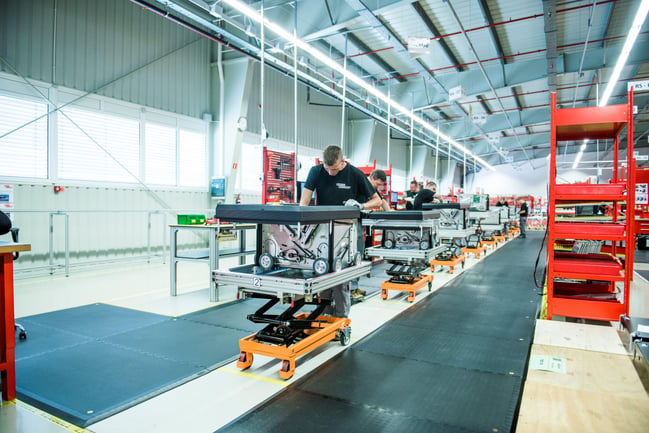Technology is rapidly changing every industry, and the manufacturing industry is going through another industrial renaissance. Industry 4.0 is already an established term, and manufacturing companies are urged to invest in new ways of designing and producing products. How does all of this affect your shop floor workers?
Don't be the obsolete dinosaurs
So, your everyday life is bombarded with IoT gadgets and smart systems, but your shop floor workers are manually working their machines, working from printed-out procedures, and doing manual stock control.
In their everyday life, your workforce is used to a faster way of solving problems. What happens if they can’t use the same benefits of technology at their job?
If you're not looking into the possibilities that a digital transformation gives, then you're at risk of becoming an obsolete dinosaur. The essence of digital transformation is all about modernizing your business so that you will remain competitive in the 21st century - with highly motivated shop floor workers.
Digital transformation is not just about the risk of falling behind, it's also about the opportunity that lays ahead. Let's look at 3 important aspects where a digital transformation will improve the everyday lives of your factory floor workers:
-min.jpg?width=649&name=mechanical_05%20(2)-min.jpg)
1. Safety:
If you're used to procedures hung up on a wall or gathered in a folder, then it's outdated the moment it leaves the printer. Digital transformation is all about information being updated and available at all times.
The old way may be ok for your senior staff that has the wisdom and experience to operate your machinery with a blindfold on, but consider trainees, seasonal workers, and bilingual workers: an outdated procedure can have a major safety effect on how to operate machinery correctly or act according to safety protocols.
A great example of how technology has improved safety for shop floor workers is when it comes to handling chemicals. If there has been an accidental release out in the field, you won’t have time to run to your shop floor manager's office to blow the dust off the Safety Data Sheet (SDS) binder to read the first aid measure. Instead, you use your phone to scan the QR codes on product labels to provide you with the relevant SDS measures in seconds.
2. Efficiency:
If you're a traditional repetitive manufacturer or manufacturing just-in-time, the shop floor mantra is all about being efficient. Digital transformation has made manufacturers take a quantum leap with regard to efficiency.
Many companies see the benefit of digitizing their factory machine park to simplify data entry and gain real-time data on product conditions and availability. If the data from the machine park is then sent to the cloud, then your shop floor workers can access that information from any workstation at any time. When data becomes available, workers are empowered to make better decisions by investigating and experimenting with the information they have available.
Also, bring on the gadgets! The days of manually checking and counting are over. Invest in handheld devices that communicate with your systems and machine park.
-min.jpg?width=649&name=mechanical_01%20(2)-min.jpg)
3. Quality:
Your shop floor workers are your best resources to manage quality issues when they arise but also before they happen.
In a digitally connected factory, you receive alerts whenever a machine requires attention, and get real-time information about machine use and potential downtime. This way, if a machine is down, your shop floor workers can easily act without having to wait for a manager to make a decision. All they need is a PC or tablet at hand to get the job done.

Making change a positive transformation
With digital transformation, automation, and robots entering the factory floor, workers will to some degree always fear that their jobs are at risk. No matter how great something can end up being, people are not always eager to change. Some might even be opposed to change.
Therefore, focusing on the positive effects of new technologies is important: Tablets, connected machines, gadgets that make processes easier to do, improving efficiency, safety, and quality. The list goes on, and all of this affects the worker’s motivation and job satisfaction. In the long run, those are the key ingredients to a happy workforce, and what takes your company ahead of the competition.







